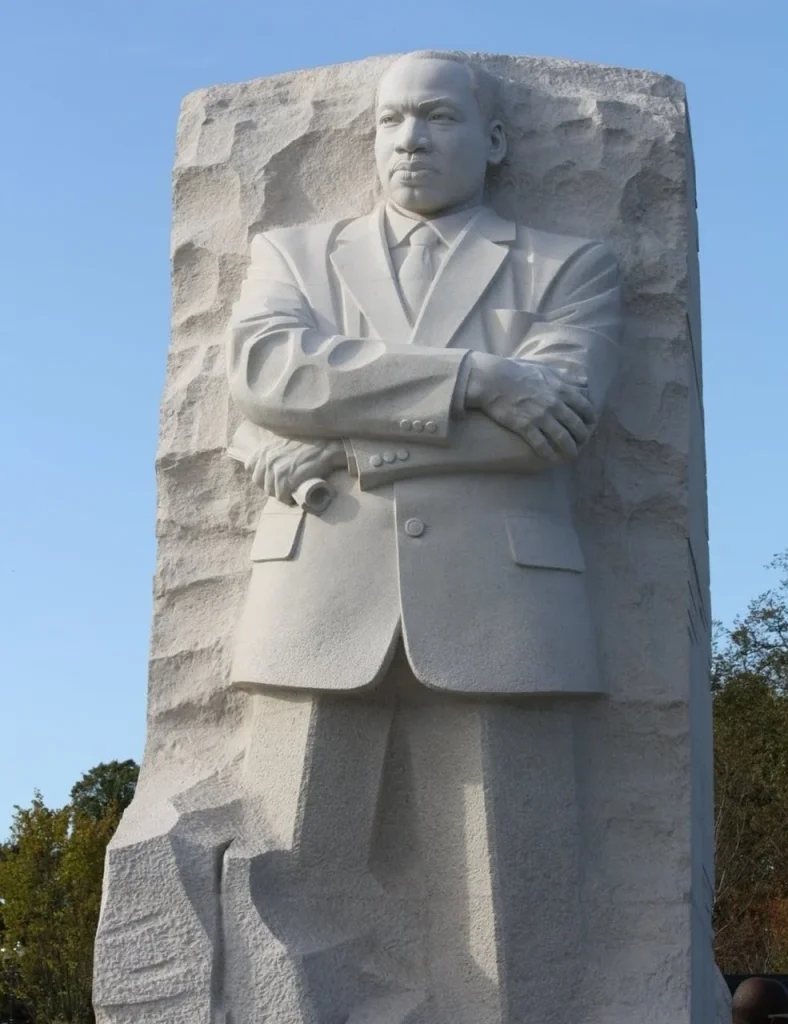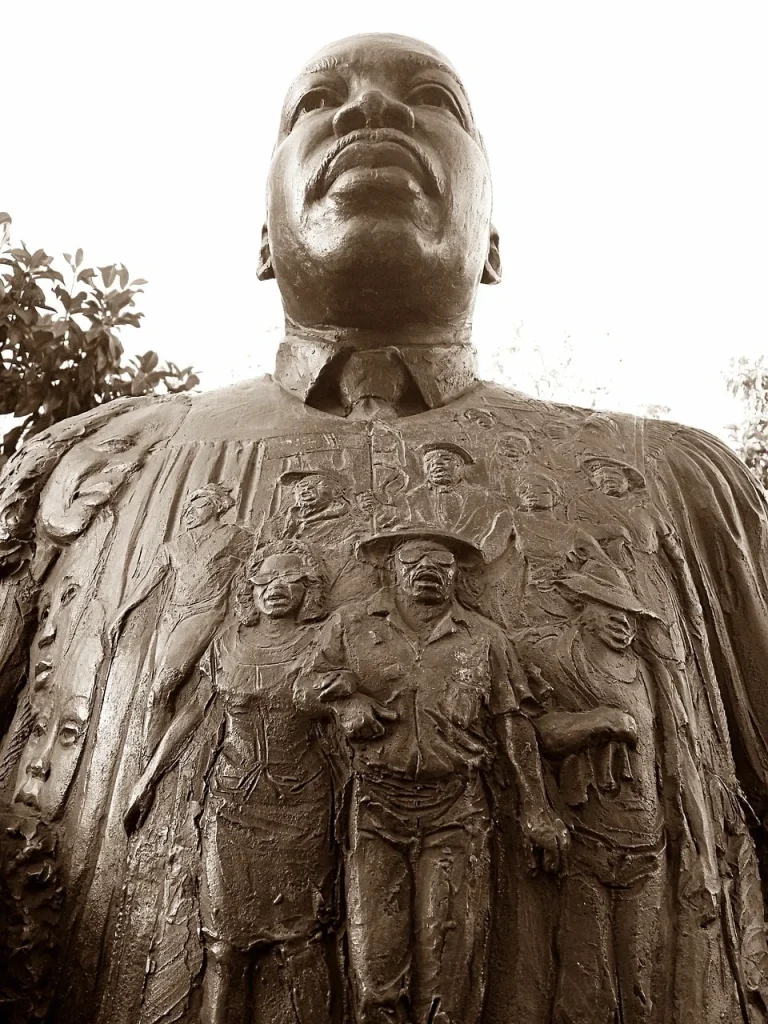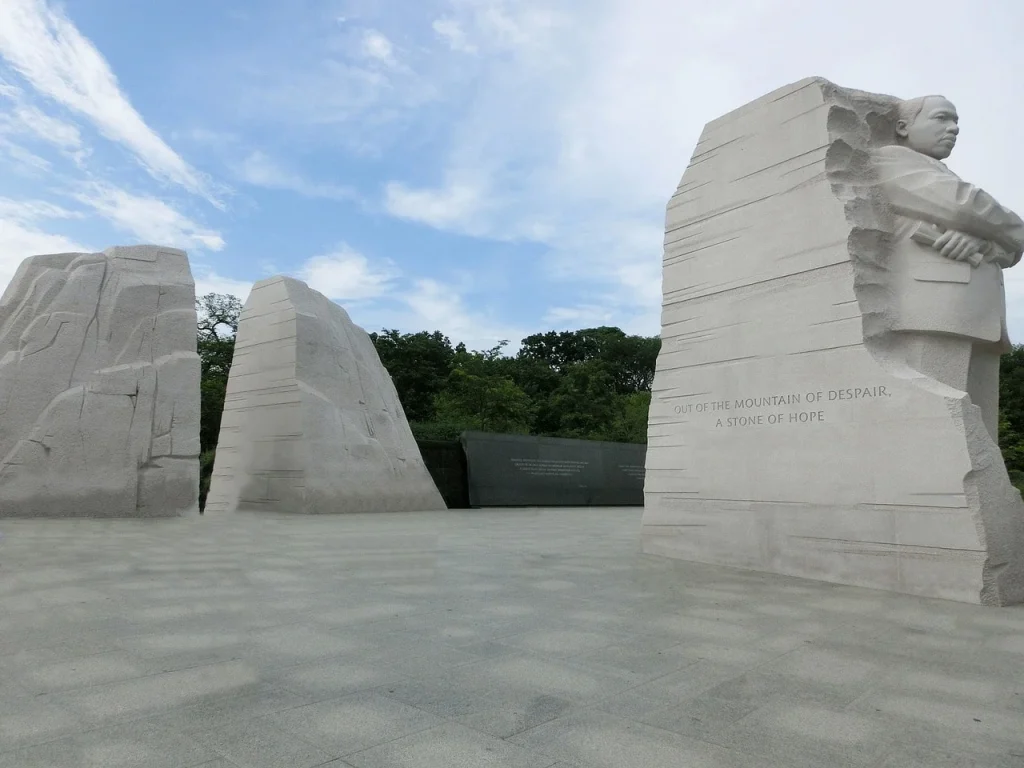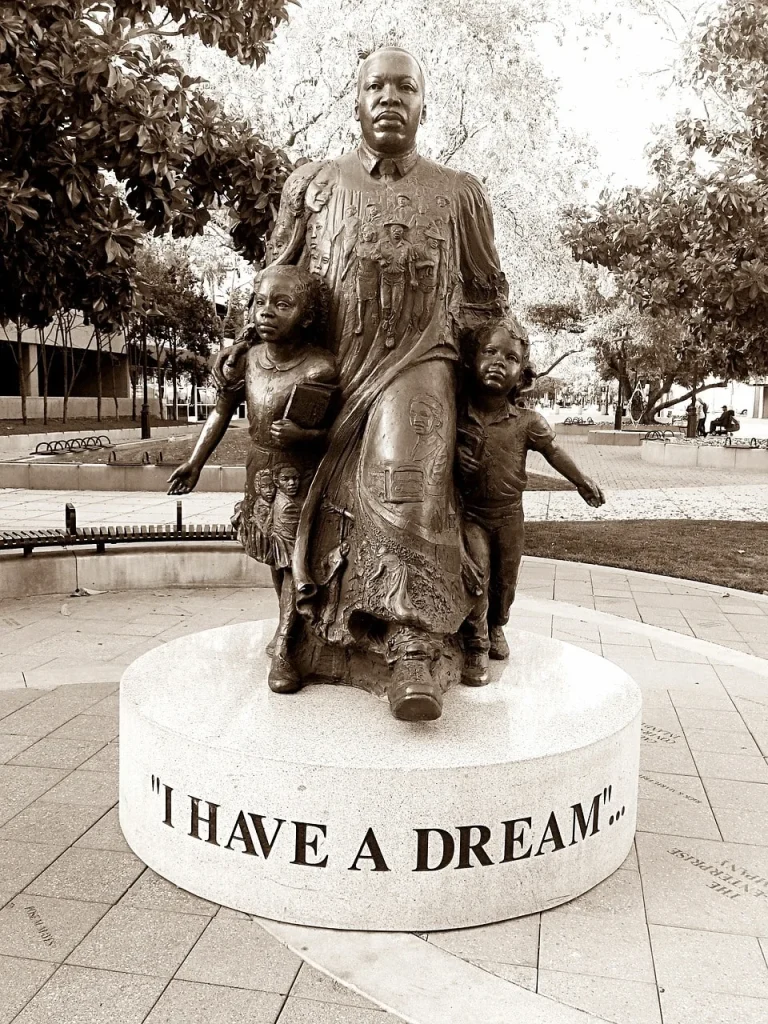What makes a hero? For many, Martin Luther King Jr. epitomizes the very essence of heroism through his leadership, courage, and unwavering commitment to peace and justice. Beyond his iconic role in the civil rights movement, King’s life was rich with stories of humanity, perseverance, and hope.
As we delve into all these interesting facts about Martin Luther King Jr., we uncover the layers of a man who fought not only for the rights of African Americans but for the dignity of all oppressed peoples, making him a timeless figure of inspiration.
In the end, we will remember not the words of our enemies, but the silence of our friends.
Martin Luther King Jr.
Martin Luther King Jr Facts
Before we dive into the compelling facts, keep in mind that there’s a quiz waiting at the end of this article. Pay close attention to each detail if you’re eager to demonstrate your expertise on this iconic figure.
- Originally named Michael King Jr., his and his father’s names were changed in homage to the German theologian Martin Luther following a trip to Germany.
- At 35, he became the youngest recipient of the Nobel Peace Award.
- Before his renowned “I Have a Dream” speech, he had already addressed a crowd at the Lincoln Memorial in 1957 during the Prayer Pilgrimage for Freedom.
- A decade prior to his death, he survived an assassination attempt when a woman attacked him with a letter opener during a book signing event.
- He was in Memphis to show his support for the striking sanitation workers when he was assassinated.
- The iconic section of his “I Have a Dream” speech was extemporaneously spoken.
- In his final public address, he prophetically spoke of having seen the “Promised Land,” hinting at his impending death.
- J. Edgar Hoover saw him as a threat, prompting the FBI to scrutinize him from 1963 until his demise.
- More than 900 U.S. streets bear his name.
- Six years after her son’s assassination, Alberta Williams King was also killed in the very church where her son used to preach.
- An enthusiast of Star Trek, he commended Nichelle Nichols for her groundbreaking role on American television.
- At age 12, he questioned the resurrection of Jesus and the infallibility of the Bible in a Sunday school class.
- He started college at the tender age of 15, having skipped two grades in high school.

- Gandhi’s nonviolence and the teachings of Jesus on love greatly influenced his approach to civil rights.
- Throughout his activism, he was arrested almost 30 times, for both acts of civil disobedience and trivial infractions like speeding.
- The “Letter from Birmingham Jail” was initially penned in the margins of a newspaper, articulating the interconnectedness of justice everywhere.
- A prolific orator, he gave more than 2,500 speeches in his 11-year activism career.
- His final home in Atlanta forms part of the King Historic Site, drawing numerous visitors each year.
- Despite his peaceful approach, at one point, about 63% of Americans viewed him unfavorably, highlighting the country’s polarization.
- He was awarded a Grammy posthumously for Best Spoken Word Album.
- King was an early reader, learning to read before starting formal education.
- His assassination sparked riots in over 100 U.S. cities, underscoring profound national divides.
- The King family was awarded $100 in a civil trial that found government entities possibly complicit in his murder.
- He supported Operation Breadbasket, an effort aimed at boosting economic conditions for African Americans.
- On the eve of his death, he spoke about his mortality with eerie acceptance.
- His intellectual curiosity and deep theological commitment are evident from his academic records at Crozer Theological Seminary and Boston University.
- A visit to Gandhi’s birthplace in India profoundly deepened his commitment to nonviolent protest.
- The FBI notoriously suggested he commit suicide in a letter, to prevent public embarrassment over his personal affairs.

- Though his March on Washington speech is critically acclaimed, it wasn’t his personal favorite.
- In 1963, Time magazine honored him as “Man of the Year.”
- He found inspiration in Henry David Thoreau’s “Civil Disobedience,” advocating for social justice through peaceful protest.
- A statue in his honor stands among the martyrs of the 20th century in Westminster Abbey, London.
- Beyond his activism, King was a talented musician, playing the piano and singing in the choir.
- The King Center, established by his widow, serves as the definitive living memorial to his legacy.
- He was posthumously awarded a Grammy for Best Spoken Word Recording.
- His opposition to the Vietnam War reflected his broader commitment to fighting injustice wherever it was found.
- The site of his assassination, the Lorraine Motel, is now a crucial part of the National Civil Rights Museum.
- Monuments and educational institutions worldwide honor his global impact, demonstrating the universal appeal of his message.

- A detailed FBI surveillance report from the day before he was killed, released in 2008, highlights the intense scrutiny he faced.
- Throughout his life, he authored five books aiming to capture the essence of the civil rights movement’s struggle and aspirations.
- King was an exceptional scholar, holding a degree in sociology and a doctorate in theology.
- The Montgomery Bus Boycott, which he significantly led, concluded with a Supreme Court decision that desegregated public transportation.
- Walter Rauschenbusch’s work, which argued for Christianity’s role in addressing societal issues, heavily influenced him.
- Despite global recognition, King remained deeply dedicated to his family, often finding it challenging to balance his public and private lives.
- The constant threats to his life took a significant toll on his and his family’s well-being.
- King’s rhetorical skill often masked the immense pressure he faced, including surveillance, death threats, and criticism.
- The King Papers Project is a scholarly endeavor aiming to publish a comprehensive fourteen-volume series of his most important works.
- His death hastened the enactment of the Civil Rights Act of 1968, which included crucial fair housing measures.
- King maintained an intensive travel schedule, speaking against injustice nationwide, despite health challenges.
- King’s articulate and powerful oratory skills were honed during his time at Boston University, where he developed his philosophy of nonviolence and deepened his understanding of social justice principles.
Martin Luther King Jr Myths

Moving forward, we dive into the myths surrounding Martin Luther King Jr. It’s time to distinguish fact from fiction and unveil the truth behind common misconceptions.
- Martin Luther King Jr. Was Solely a Domestic Civil Rights Leader
His influence reached well beyond the United States’ borders. Advocacy for peace and justice was spread globally by him, making significant impacts on international human rights movements. His messages of non-violence and equality were heard worldwide. - He Was Universally Loved During His Time
Controversial was how he was considered by many during his lifetime. Resistance and criticism were often faced by him, not only from opponents of civil rights but sometimes from within the movement itself, due to his nonviolent approach. - His Work Was Focused Only on African American Rights
His advocacy extended to all underprivileged and marginalized groups. Poor people, irrespective of race, were fought for by him, and he was a vocal critic of the Vietnam War, highlighting his broad focus on justice and equality. - King’s Rhetoric Was Always Met with Peace
Violent responses were frequently incited by his peaceful protests. Brutally attacked were his peaceful demonstrators, and he himself was arrested multiple times. His commitment to nonviolence was tested but never wavered. - His Impact Ended with His Assassination
Strengthened, rather than diminished, was his legacy after his death. Continuously inspired by his words and actions are movements for equality and justice worldwide. His teachings remain a cornerstone of the struggle for civil rights and human dignity.
No products found.
Martin Luther King Jr Quotes

Let’s continue our journey with some of my favorite quotes that Martin Luther King Jr. said. Feel free to share yours in the comments so I can add them to the list as well.
Darkness cannot drive out darkness; only light can do that. Hate cannot drive out hate; only love can do that.
Martin Luther King Jr.
A cornerstone of his philosophy, this quote embodies his belief in love and nonviolence as the most powerful forces for change.
The ultimate measure of a man is not where he stands in moments of comfort and convenience, but where he stands at times of challenge and controversy.
Martin Luther King Jr.
He challenges us to evaluate character based on actions taken during difficult times, emphasizing integrity and courage.
Life’s most persistent and urgent question is, ‘What are you doing for others?’
Martin Luther King Jr.
With this question, he invites reflection on altruism and the importance of service to humanity.
Faith is taking the first step even when you don’t see the whole staircase.
Martin Luther King Jr.
This quote speaks to the power of faith and courage in the face of uncertainty and the unknown.
Our lives begin to end the day we become silent about things that matter.
Martin Luther King Jr.
Here, he warns against the dangers of apathy and the moral imperative to speak out against injustice.
Martin Luther King Jr FAQ

As we transition from the inspiring words of Martin Luther King Jr. to our final segment, the FAQ section stands before you. This precedes the quiz, so reading carefully is key to grasping the full essence of his legacy.
- Where did Martin Luther King Jr. grow up?
He was born and raised in Atlanta, Georgia. He grew up in a loving family deeply rooted in faith and activism, which played a pivotal role in shaping his life’s mission. - How did Martin Luther King Jr. change the world?
He profoundly changed the world by leading nonviolent protests to fight racial segregation and inequality in the United States. His eloquent speeches and steadfast dedication to peace and justice paved the way for significant civil rights advancements, including the Civil Rights Act of 1964 and the Voting Rights Act of 1965. - What was Martin Luther King Jr.’s most famous speech?
King’s most famous speech is undoubtedly “I Have a Dream,” delivered on August 28, 1963, during the March on Washington for Jobs and Freedom. It is celebrated for its powerful vision of a world where people are judged by the content of their character rather than the color of their skin. - Why did Martin Luther King Jr. receive the Nobel Peace Prize?
He was awarded the Nobel Peace Prize in 1964 for his nonviolent struggle against racial segregation and for his efforts to promote peace and equality. At the time, he was the youngest person ever to receive this honor, underscoring the global impact of his work. - What led to Martin Luther King Jr.’s assassination?
He was assassinated on April 4, 1968, in Memphis, Tennessee, where he had gone to support a sanitation workers’ strike. His assassination was a tragic end to his life but not to his legacy, which continues to inspire movements for justice and equality worldwide.
No products found.
Martin Luther King Jr Trivia

Are you ready to test your knowledge? Be warned: fail to answer correctly, and you might just find your dreams filled with history books chasing you for a midnight lesson!
Conclusion
As we wrap up our journey exploring the remarkable life and legacy of Martin Luther King Jr., it’s clear that his vision for equality and justice has left an indelible mark on the world. King wasn’t just a dreamer; he was a doer who believed in taking concrete actions to bring about change.
His courage to stand up for what’s right, even in the face of immense challenges, inspires us all to be better citizens. King’s message of peace and brotherhood reminds us that, despite our differences, we have more in common than we often realize.
So, let’s carry forward his legacy by treating everyone with respect and kindness, just as he did. Till next time, stay curious and explore more. Cheers.
3 Sources Used For This ArticleMartin Luther King Jr. – History
10 Martin Luther King Jr Accomplishments – Have Fun With History


